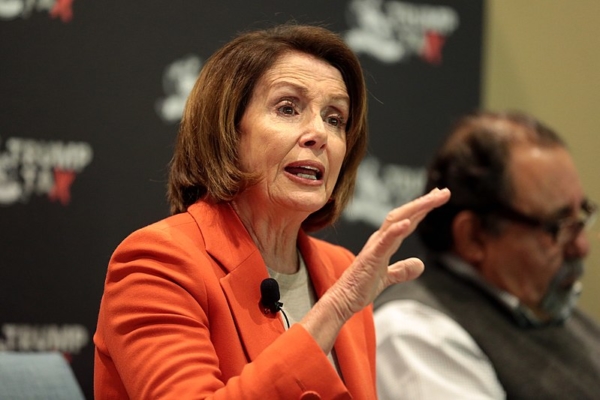
Wikimedia Commons
The Mainstream Media seemed to relish the conflict between House Speaker Pelosi and moderate Democrats over the President’s $3.5 trillion “human infrastructure” spending plan. A CNN opinion piece screamed, How the Mess in Congress Shows why Democrats are Right to be Freaking Out, while a headline in Politico read, Mutually Assured Destruction. Of course, Democracy is a messy process and Democratic party politics is even messier. But in the end, the budget resolution passed the House on Tuesday after leadership reached an agreeent with moderate Democrats to vote on a separate, bipartisan infrastructure package on September 27th.
“The agreement reached will kick off a flurry of activity over the next several weeks as top House Democrats work with their Senate counterparts to privately craft a spending bill that can pass both chambers.” – Politico, 8/24/21
Lost in much of the coverage is the actual intent of the budget resolution – to lift-up vulnerable Americans during very trying times, especially the nation’s seniors.
President Biden praised Congress’ progress on his “Build Back Better” agenda Tuesday afternoon, saying the country is a “step closer to truly investing in the American people.” – CBS News, 8/24/21
The passage of the resolution by the House sets up a budget reconciliation process where the President’s (and most Congressional Democrats’) priorities can move forward, even if Republicans refuse to support them. Once the reconciliation process is over sometime this fall, seniors are likely to see historic expansions in the social safety net that protects them.
“Passing this rule paves the way for the Building Back Better plan, which will forge legislative progress unseen in 50 years, that will stand for generations alongside the New Deal and the Great Society.” – House Speaker Nancy Pelosi, 8/24/21
The Biden/Democratic plan includes adding dental, vision, and hearing coverage to traditional Medicare. This expanded coverage is crucial to seniors’ overall health, since the absence of proper dental, vision, and hearing care can increase the risk of grave medical consequences – from dementia to disabling injuries. Seniors have not seen their Medicare benefits expanded since 2003 with the passage of the significant, but flawed Part D prescription drug program.
The budget legislation will aim to correct the main shortcoming in Medicare Part D by allowing the program to negotiate drug prices directly with Big Pharma. This will save beneficiaries an estimated $102 billion over ten years. The National Committee has fought hard for this goal, as it is one of the most effective methods to bring down prescription prices not only for seniors – but for all Americans.
Similarly historic would be the allocation of billions of new federal Medicaid dollars for Home and Community Based Services (HCBS), which allow seniors to receive long-term care outside of institutional settings. Research has shown that older people have better health outcomes when they can remain in their homes and communities. Meanwhile, the pandemic has only highlighted the risks of putting seniors into nursing homes.
Now that the budget resolution has passed, the committees of jurisdiction in the House and Senate can begin drafting actual reconciliation legislation with specific dollar figures attached to each initiative. That process is expected to begin in September, with a vote on the package sometime this fall. There are no guarantees here. NCPSSM Director of Government Relations and Policy Dan Adcock says that negotiators will try to cleave to the President’s priorities, but will likely have to compromise on some items in order to win enough votes within the Democratic caucuses in both houses.
Some of the moderates who rebelled against Speaker Pelosi’s plan to move forward on the budget resolution have expressed skepticism about the $3.5 trillion price tag and may try to reduce it. So have Sens. Joe Manchin (D-WV) and Krysten Sinema (D-AZ), whose votes are crucial to the passage of a reconciliation bill in the Senate.
If the overall amount of the spending plan is reduced, some of the party’s (and the President’s) priorities may be squeezed. Adcock says that the President’s proposal to spend an additional $400 billion on HCBS, for instance, will probably be lowered to something approximating $150 billion instead. A compromise on Medicare expansion may involve more modest dental, vision and hearing coverage – or the addition of one of those (most likely dental) coverages at the expense of the others. “We’re looking at the most we can get (for seniors) given the current political circumstances,” says Adcock, noting that Democrats have the slimmest of margins in the House and Senate.
Amid the uncertainty and likely compromises, though, it’s important to keep in mind that progress on any of these priorities would be historic. This is the first time in 12 years that both President and the majority party in Congress are committed to a long-overdue widening of America’s social safety net. In the wake of a Great Recession, growing wealth inequality, soaring health care and prescription prices, and a devastating pandemic, Americans of all ages should rightly expect to see these expansions finally become law.


